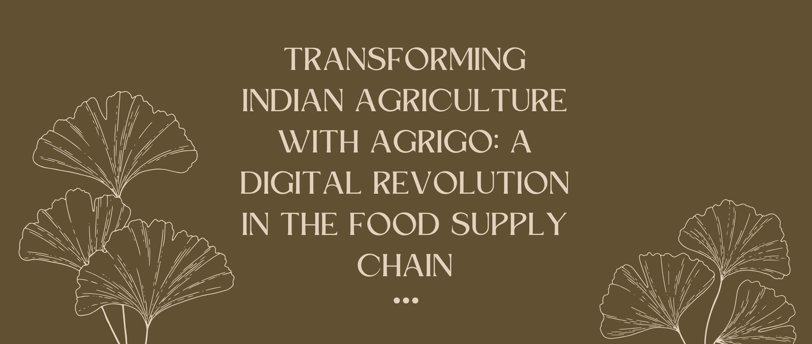Transforming Indian Agriculture with AgriGo: A Digital Revolution in the Food Supply Chain
Chithralekha Rajeev
10/10/20233 min read


Agriculture remains the backbone of India’s economy, yet the sector is beset with systemic challenges that hinder growth and sustainability. Small-scale farmers, the lifeblood of Indian agriculture, face limited access to fair markets, outdated supply chains, and significant food wastage. Enter AgriGo, a transformative digital platform designed to address these critical issues and revolutionize the agricultural landscape.
AgriGo is not just a solution; it is a comprehensive digital ecosystem. By connecting small farmers directly with buyers, integrating local transportation networks, and providing transparent pricing, AgriGo ensures a more efficient, equitable, and sustainable agricultural supply chain.
The Challenges in Indian Agriculture
Market Access and Fair Pricing:
Farmers often rely on intermediaries to sell their produce, resulting in reduced profits and exploitative pricing. The lack of direct market access undermines their financial stability.Inefficient Supply Chains:
Labor-intensive processes, logistical bottlenecks, and delays in delivery contribute to substantial food loss during transportation and storage.Food Wastage:
Approximately 40% of agricultural produce is wasted due to inefficiencies in distribution and storage, exacerbating food insecurity.Digital Divide:
Many small-scale farmers remain excluded from India’s digital revolution, limiting their ability to access modern tools and resources.
AgriGo: The Solution
AgriGo is a digital platform that redefines agriculture by creating a seamless marketplace connecting farmers and buyers. With a focus on fair pricing, efficient logistics, and digital empowerment, AgriGo transforms how food is distributed and consumed.
Key Features of AgriGo:
Digital Marketplace:
A virtual platform where farmers can list their produce and buyers can directly place orders. This eliminates the reliance on middlemen, ensuring farmers receive fair prices.Dynamic Pricing Transparency:
AgriGo provides real-time market price updates, enabling farmers to make informed decisions about pricing their goods.Logistics Integration:
By incorporating local transportation networks, AgriGo ensures cost-effective and timely delivery, minimizing delays and reducing food loss.Accessible Design:
Designed to cater to rural users, AgriGo is mobile-friendly, multilingual, and intuitive, making it accessible to first-time users.Support Services:
Beyond being a marketplace, AgriGo provides farmers with educational resources on sustainable farming practices and offers a helpline for technical support.
What Sets AgriGo Apart?
AgriGo stands out by combining advanced technology with an in-depth understanding of the agricultural ecosystem. Here’s what makes it unique:
Data-Driven Insights:
AgriGo leverages data analytics to identify market trends, predict demand, and optimize pricing.End-to-End Supply Chain Optimization:
From farm to table, AgriGo streamlines every step of the process, reducing waste and improving efficiency.Empowering Farmers:
By providing direct access to buyers and transparent pricing tools, AgriGo enhances financial independence and reduces exploitation.Sustainability Focus:
Through education and resources, AgriGo promotes environmentally friendly practices, contributing to long-term agricultural sustainability.
Impact of AgriGo
AgriGo is creating a measurable impact on Indian agriculture, addressing critical pain points and driving meaningful change:
Fair Pricing for Farmers:
By bypassing middlemen, farmers are earning 25–30% more for their produce.Reduced Food Wastage:
Efficient logistics and timely delivery have significantly decreased food loss during transportation and storage.Increased Financial Independence:
Farmers gain direct access to markets, enhancing their incomes and fostering a sense of empowerment.Digital Inclusion:
AgriGo bridges the digital divide by making technology accessible to rural communities, integrating them into India’s digital economy.Sustainable Agriculture:
By promoting sustainable practices, AgriGo aligns with India’s broader goals of environmental conservation and resource efficiency.
Technical Overview
The success of AgriGo lies in its robust technical architecture:
Scalable Cloud Infrastructure:
AgriGo is built on a cloud-based system capable of handling large volumes of data and scaling to meet demand.Real-Time Analytics:
Predictive algorithms analyze market trends, pricing fluctuations, and demand patterns to provide actionable insights.Mobile-First Design:
Prioritizing accessibility, the platform is optimized for mobile devices, ensuring usability in rural areas with limited digital infrastructure.Secure Transactions:
End-to-end encryption and compliance with data protection regulations ensure secure and reliable transactions.
Future Vision
AgriGo is just the beginning of a broader transformation in Indian agriculture. Future plans include:
National Expansion:
Scaling AgriGo to serve farmers across all regions of India, ensuring equitable access to its benefits.Advanced Analytics:
Integrating AI-driven demand forecasting and crop recommendation models to help farmers plan better.Financial Services Integration:
Offering access to microloans, crop insurance, and government subsidies directly through the platform.Global Reach:
Connecting Indian farmers to international markets, unlocking new revenue streams and boosting exports.
Conclusion
AgriGo represents a bold step forward in addressing the systemic challenges of Indian agriculture. By combining technology, data-driven insights, and a commitment to fairness and sustainability, AgriGo empowers farmers, optimizes supply chains, and reduces food waste. It’s more than a platform; it’s a movement that bridges the gap between rural communities and modern markets, transforming agriculture into a more inclusive and efficient ecosystem.
